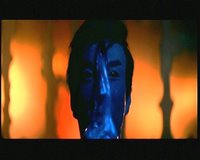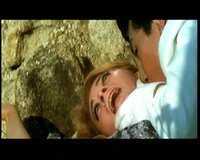
Director: Hajime Sato
Release date: 1968
Contains spoilers
Goke, or Kyuketsuki Gokemidoro, is a strange film that sees science fiction crossing with the vampire genre to produce a, none too subtle, anti-war (and more specifically anti-Vietnam war) film. First of all we must say a thank you to Quentin Tarantino, as it is his homage to the film that has undoubtedly given cause for its subtitled DVD release. The back of the box has a quote from Tomohiro Machityama regarding Tarantino and the influences for “Kill Bill” (2003/04):
 “For the orange sunset sky behind the airplane, he wanted to evoke the look of the opening scenes from Goke, Bodysnatcher from Hell.”
“For the orange sunset sky behind the airplane, he wanted to evoke the look of the opening scenes from Goke, Bodysnatcher from Hell.”The film does indeed open with this scene and the pilot (Hiroyuki Nishimoto) is worried. We then see a newspaper, read by politician Mr Mano (Eizo Kitamura), which reads “British ambassador assassinated with rifle.” Mano is travelling with business man Mr Tokiyasu (Nobuo Kaneko) and Tokiyasu’s wife, Noriko (Yuko Kusunoki). Also on the plane are space biologist Sagai (Masaya Takahasi), a young man Matsumiya (Toshihiko Yamamoto), a psychiatrist Dr Momotake (Kazuo Kato), Hirafumi Teraoka (Hideo Ko) and the American Mrs Neale (Kathy Horan).
 Mrs Neale screams as a bird flies into her window and dies, its wings smearing the glass with blood (the suicidal birds are amongst the better of the effects in the film). At the same time the pilot receives a radio communication telling him that the police have been told of a bomb on board, possibly carried by a suicide bomber, and is told to turn the plane around. He sends the co-pilot, Ei Sugisaka (Teruo Yoshido) to check the hand luggage of the passengers. As he is doing so he explains to the passengers that a bag for the next flight has accidentally been placed on the plane. The psychiatrist asks if he is actually looking for a bomb and he replies that the bag contains important business papers, so the psychiatrist explains that he only wanted to see the passengers’ reaction to the stress his words caused. Another bird smashes against a window and comment is made about birds being sensitive and that something must be happening as they are committing suicide.
Mrs Neale screams as a bird flies into her window and dies, its wings smearing the glass with blood (the suicidal birds are amongst the better of the effects in the film). At the same time the pilot receives a radio communication telling him that the police have been told of a bomb on board, possibly carried by a suicide bomber, and is told to turn the plane around. He sends the co-pilot, Ei Sugisaka (Teruo Yoshido) to check the hand luggage of the passengers. As he is doing so he explains to the passengers that a bag for the next flight has accidentally been placed on the plane. The psychiatrist asks if he is actually looking for a bomb and he replies that the bag contains important business papers, so the psychiatrist explains that he only wanted to see the passengers’ reaction to the stress his words caused. Another bird smashes against a window and comment is made about birds being sensitive and that something must be happening as they are committing suicide.Sugisaka reaches Hirafumi and asks for his bag but he claims he does not have one, when stewardess Kazumi Asakura (Tomomi Sato) calls the co-pilot into the crew area.
She has found a bag under a table and Sugisaka jimmies it open. Inside it looks normal but there is a strange vial, which he opens and drops. The acid contained in the vial spills and eats away a false lining, revealing a rifle. Hirafumi steps in holding a gun and takes the stewardess and co-pilot back to the flight deck. He hijacks the plane, forcing the pilot to change course again, ripping out the radio, and then goes back into the cabin with Asakura. He discharges his gun and a radio comes on, the news report mentioning flying saucers.
A light flies towards the plane, straight towards the pilots, and swoops just over them, the electrics fry and the plane crash-lands, and it is here we get the opening credits!
This is one of the problems with Goke, there is so much plot that we sometimes get bogged down in the minutia, although in many respects it is refreshing given some of the plot-less wonders released. We have the corrupt politician (Mano) who is travelling with his arms manufacturing friend to pick up bribe money for government contracts; the business man has even thrown his wife into the deal. We have the mad bomber, who reveals it was all a hoax and then, much later, we find out it wasn’t. We have anti-war Mrs Neale, whose husband has just been killed in Vietnam and who, when the chips are down, becomes ruthless and willing to sacrifice another to save herself. There is the scientist who cares more about discovery and knowledge than human life. Finally there is Hirafumi, the assassin of the ambassador and would be hijacker.
The worrying thing is there is not a nice person amongst them. The psychiatrist doesn’t particularly do anything too bad, except of course panic a set of passengers with thoughts of a bomb, but his character is little more than a cipher. The only two with any integrity are from the plane’s crew, Sugisaka and Asakura, and as such they become the focal point of our sympathies. The pilot might have been a nice enough chap but he dies in the crash so we never find out.
 Ah, but where are the vampires you ask? Well our hijacker takes Asakura hostage and heads off into the night with her. They come across a light and a flying saucer glides into view. Hirafumi drops his rifle as he is drawn towards it. Now this reveals one of the shames of the movie, the special effects. Things are just a little too kitsch unfortunately. Be that as it may, he stands mesmerised within (or below?) the spaceship and seems to be observed. We then see a blob of silver goo inching its way towards him and then a split seems to appear vertically down his forehead. Asakura screams.
Ah, but where are the vampires you ask? Well our hijacker takes Asakura hostage and heads off into the night with her. They come across a light and a flying saucer glides into view. Hirafumi drops his rifle as he is drawn towards it. Now this reveals one of the shames of the movie, the special effects. Things are just a little too kitsch unfortunately. Be that as it may, he stands mesmerised within (or below?) the spaceship and seems to be observed. We then see a blob of silver goo inching its way towards him and then a split seems to appear vertically down his forehead. Asakura screams.She is found by Sugisaka, as is the rifle, but of the hijacker (and the ufo) there is no sign. He tries to get her to speak but she screams and faints. Back in the plane she seems unable to talk as she is in so much shock. On the radio we hear that rescue planes
 have been unable to find the crashed airliner and they are all assumed dead. Mano wants to try to head for civilisation but the psychiatrist reminds them all that there is a murderer missing outside who is, “Hungry for blood” – how right he is. To discover his fate they hypnotise Asakura and we finally see what occurred to Hirafumi in the ufo. The silver goo crawled up his body and entered him through the head wound.
have been unable to find the crashed airliner and they are all assumed dead. Mano wants to try to head for civilisation but the psychiatrist reminds them all that there is a murderer missing outside who is, “Hungry for blood” – how right he is. To discover his fate they hypnotise Asakura and we finally see what occurred to Hirafumi in the ufo. The silver goo crawled up his body and entered him through the head wound. This essentially has put him under alien control and turned him into a bloodsucking monster, who then goes on to prey on the other passengers. His method of feeding is much like a traditional vampire, going for the neck, though it seems to be more a sucking through the skin than biting and, in the one time we see this properly, looks suspiciously as though he is kissing the neck.
This essentially has put him under alien control and turned him into a bloodsucking monster, who then goes on to prey on the other passengers. His method of feeding is much like a traditional vampire, going for the neck, though it seems to be more a sucking through the skin than biting and, in the one time we see this properly, looks suspiciously as though he is kissing the neck.He actually captures one passenger rather than kills her and that passenger is Noriko.
 When she is found by the other passengers the next day she is atop a cliff and speaks in the voice of the aliens who inform them that they are the Gokemidoro who have come to earth in order to destroy humanity, due to the fact that humanity kill each other on a mass scale. When she has finished her speech she throws herself from the cliff she stands on and, when they reach her body, her features have rotted away.
When she is found by the other passengers the next day she is atop a cliff and speaks in the voice of the aliens who inform them that they are the Gokemidoro who have come to earth in order to destroy humanity, due to the fact that humanity kill each other on a mass scale. When she has finished her speech she throws herself from the cliff she stands on and, when they reach her body, her features have rotted away.Originally the film only called for one vampire but actor Hideo Ko had a scheduling problem and left early. This forced the filmmakers to introduce a scene where he is destroyed by having gasoline thrown on him and being set alight. We see the silver goo exit his body and then take over Sagai. Once the goo has left him his face, portrayed by an (unfortunately) obvious clay mask, crumbles apart.
The film has scenes within it that really push its anti-war/anti-violence message at you. Scenes of the ambassador being assassinated, scenes of Vietnam, scenes of atomic explosions all shown with a deeply red filter. That said, the sub-text of this message is really well done. There is a damning indictment here of the inability of humans to work together for the common good. Most of the characters are all too eager to sacrifice their fellows in order to survive and they turn on each other when they should be helping each other. At one point it is decided by Mano that sacrificing one of the passengers to the vampire might save the rest (or more importantly himself) and Sagai concurs, simply for reasons of scientific curiosity as to the actions of a vampire. There is even a rationale that politicians and scientists must be prepared to sacrifice people for the common good.
The presence of Mrs Neale is odd. It is apparent that she can understand every word of Japanese spoken and most of the passengers can understand her English, all bar Mano, for whom a character has to translate into Japanese. Sometimes, but not all the time, her words are subtitled in Japanese. Kathy Horan’s filmography actually reveals that the majority of films she starred in were Japanese movies.
Some of the scenes make little sense. At one point the survivors of the crash are digging graves for the dead from the crash and yet all survived, it seemed, bar the pilot. Perhaps the fault here is with the subtitling and it was only one grave they were digging.
The acting varies in quality but some of it is particularly poor and here I’m thinking of a scene where Mano is in desperate need of water. Eizo Kitamura's performance here seems very over the top and it actually jars a little in the film.
The greatest joy of this movie, however, is the ending – which I fully intend to spoil here. Sugisaka and Asakura manage to escape and reach a road, there is a queue of cars and all the occupants are dead. In a toll booth the attendant is desiccated, just as Noriko was. When they get to the town everyone is dead.
 They head out of town, Sugisaka predicting that humanity is doomed, and the camera pulls back, further and further until we see the entire planet hanging in the blackness of space and an armada of flying saucers approaching.
They head out of town, Sugisaka predicting that humanity is doomed, and the camera pulls back, further and further until we see the entire planet hanging in the blackness of space and an armada of flying saucers approaching.This ending is so wonderfully dour and downbeat and absolutely takes no prisoners.
Goke is an odd film, as I am sure you can tell, not only due to the mixing of genres but because of the sheer weight of sub-plots that are added into the mix. It is spoilt by some of the acting and by the effects, which look all-together too camp now-a-days and, I suspect, weren’t that good when it was released. That said I’m giving this 6.5 out of 10 and can safely predict you will never have seen anything like this in your life.
The imdb page is here.

No comments:
Post a Comment